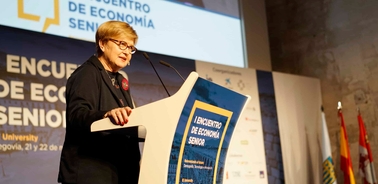- Home
- News And Events
- News
- Ie University Hosts I Senior Economy Forum
IE University hosts I Senior Economy Forum

Academics and business leaders from Spain and around the world are gathering this week at IE University’s Segovia campus to discuss the challenges posed by an ageing population, organized by the Senior Economy Forum, IE Foundation, Caixa Bank and Segovia City Council, among other institutions.
Isaura Leal, the government’s High Commissioner for the Demographic Challenge attended the opening of the event, along with Joseph Coughlin, Director of the MIT Age Lab; Juan Carlos Gallego, Executive Director of the Technical Secretariat of the Presidency of CaixaBank; Rafael Puyol, Director of the Observatory of Demography and Generational Diversity of the IE Foundation; and Carlos Mas, Executive Vice President of the IE Foundation, among others.
The experts are analyzing issues related to generational diversity, labor regulatory frameworks, the demographic dividend, depopulation, the impact of an older population on the health system, financial markets, insurance, tourism, home care, along with artificial intelligence and infrastructure, among others. The objective of the meeting is to reflect on the concerns and needs of a group that brings together experience and talent and to propose a new, inclusive and flexible model based on innovation and technology. This new model, according to the organizers, can generate wealth, industry and employment and become an economic engine. In short, the Forum aims to see the over-fifties as an economic sector in itself. "Our country can take advantage of this macro-tendency if it is able to value senior talent," say the Forum’s organizers.
The European Commission’s Silver Economy report estimates that the aggregate purchasing power of Europeans over the age of 50 is already the third-largest economy in the world. Rafael Puyol, director of the Observatory of Demography and Generational Diversity of the IE Foundation and co-director of the event, highlighted that "there is a new senior profile characterized by being more active and independent, who likes to travel and is familiar with new technologies. It is imperative to make the most of this senior talent beyond retirement."
Also attending the event were the Director General of the Foundation for Health Innovation and Prospective in Spain, Alfonso Beltrán, the Chief Executive Officer of the National Innovation Company (ENISA), José Bayón, and Pilar Manchón, Vice President of Artificial Intelligence at Roku Inc., among others. All the experts ware tackling, during two days, this demographic challenge and how to address it with innovative, technological, social, sustainable and inclusive approaches.
Isaura Leal, Spanish Government’s High Commissioner for the Demographic Challenge, highlighted that “Spain is the country with the highest life expectancy within the European Union”. In this context, she analyzed the situation of the senior generation confronting aging and unemployment. “The senior professionals want to become active and constructive opportunity creators. This is why we need an intergenerational pact for senior people who can play an important role”, Leal said.
"The opportunity is there, it is huge, and it has the potential to boost our economy, while it can change the story of an era in the life of the human being that has to be redefined, and which is already being redefined," pointed out Rafael Puyol and Benigno Lacort, president of the Senior Economy Forum.
About IE University
IE University offers a technology-based learning ecosystem for leaders making a difference in the world through innovation, global vision, an entrepreneurial mindset and a unique, Humanities-based approach. IE University’s faculty is made up more than 500 professors who currently teach degree and master's programs, doctorates and executive training to students from 131 countries. IE University's more than 50,000 alumni are present in 165 countries.